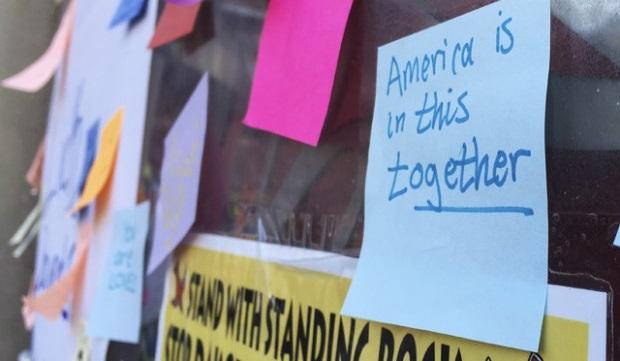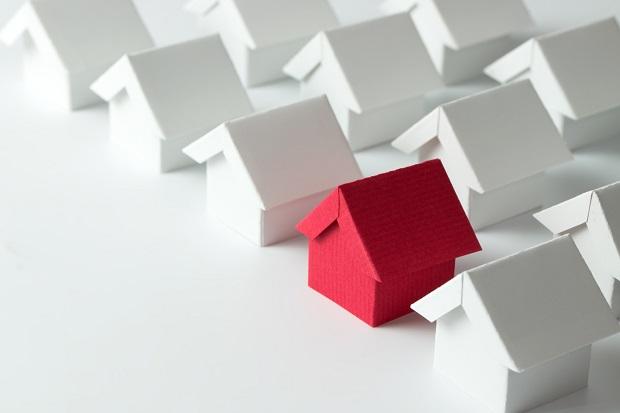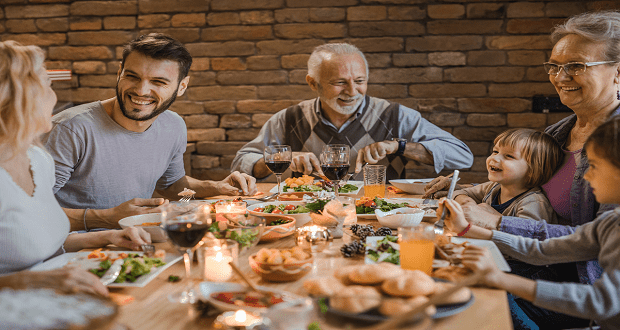
Wall of empathy at 16th BART station (San Francisco). Photo by Lola M. Chavez
I had to take an Ambien last week. Sleep was the only way to escape the nightmare we’re now living. Even after popping the pill, I couldn’t rest. I felt loopy. I guess when they go low, I get high.
Except I can’t close my eyes to the fact that almost half of voters chose a candidate who ran on a platform of hate and bigotry. More than a week after the election, it still doesn’t feel real. We’re trapped in a warped reality show the star of which is a villain—because isn’t every reality-TV-show star? No one pays attention to the smart, sane people on such shows, and black individuals never win. Unless you’re Omarosa Manigault, proof that if you’re deplorable enough, you get a prime role on this season of American Horror Story (no, not the one on FX).
So now what?
I don’t know. The unthinkable happened. I’m not prepared. I’m still sad and mad. I’m angry at people who voted for third-party candidates. They went with their conscience, and I can only hope that the current political situation is now weighing heavily on it.
I’m also annoyed by the nearly half of eligible voters who, frankly, don’t deserve to live in a democracy since they can’t be bothered to help uphold it by filling in some bubbles one day out of the year. People who did not vote could have made clear their opinions on taxes, living standards, climate change, personal safety, national security, their kids’ schools, etc. They don’t care, and I don’t care about their opinions.
As an immigrant, I’m particularly passionate about the democratic process. People all over the world are killed and imprisoned for doing what many in this country take for granted. Shame on people for taking this right for granted. If you are black and didn’t vote, then no, you don’t believe that black lives matter. If you are a part of the LGBTQ community and stayed home, then you don’t care about your own dignity. I could go on, but while I do not care about these people’s opinions, I still care about them. That’s why I voted.
And then there are those who actively chose our Bigot-elect. I get it. They may not be hateful themselves, but they were obviously OK enough with the rhetoric to vote in this way. But now that they got the candidate they wanted, it’s time for them to stand up for what’s right. There isn’t reason anymore to look past Trump’s previously stated positions, current appointment of hate-mongers like Steve Bannon, and other present and future actions.
At this stage, if you are expressing appreciation for President-elect Trump without voicing opposition to his acts that continue to tear apart the country, then you are no patriot. Instead of scorning, ridiculing, or dismissing people who criticize our future President, take time to understand that people are not mainly upset that their candidate lost. They’re sad that hate has won.
At least so far.
Everyone—that means everyone—now has a responsibility to call out Trump for actions that violate notions of common decency, freedom, and democracy. Don’t say that you’re ready to leave the country. You know you won’t actually do it. No, stay and fight for change. Call your legislators, involve yourselves in your community, and, when the next election rolls around, as our current President urged, “Don’t boo. Vote!”
Also, I have friends and family who voted for Trump. I’m not kicking them out of my life, nor am I asking them to disown me on social media. At these moments, it’s important to remember again that there are no bad people. There are only bad acts. It’s unfair to judge the totality of a person based on a vote. While I don’t think there’s any logical justification for choosing Trump, I nonetheless want to understand better why people did. The more we can learn about and empathize with each other, the likelier that we will be stronger together.
At the same time, it’s critical for all of us to remain vigilant. Let’s not merely comfort ourselves and others with simple platitudes like, “Things will be all right.” Things are not all right. Maybe one day they will be, but that won’t happen as a result of apathy.


















